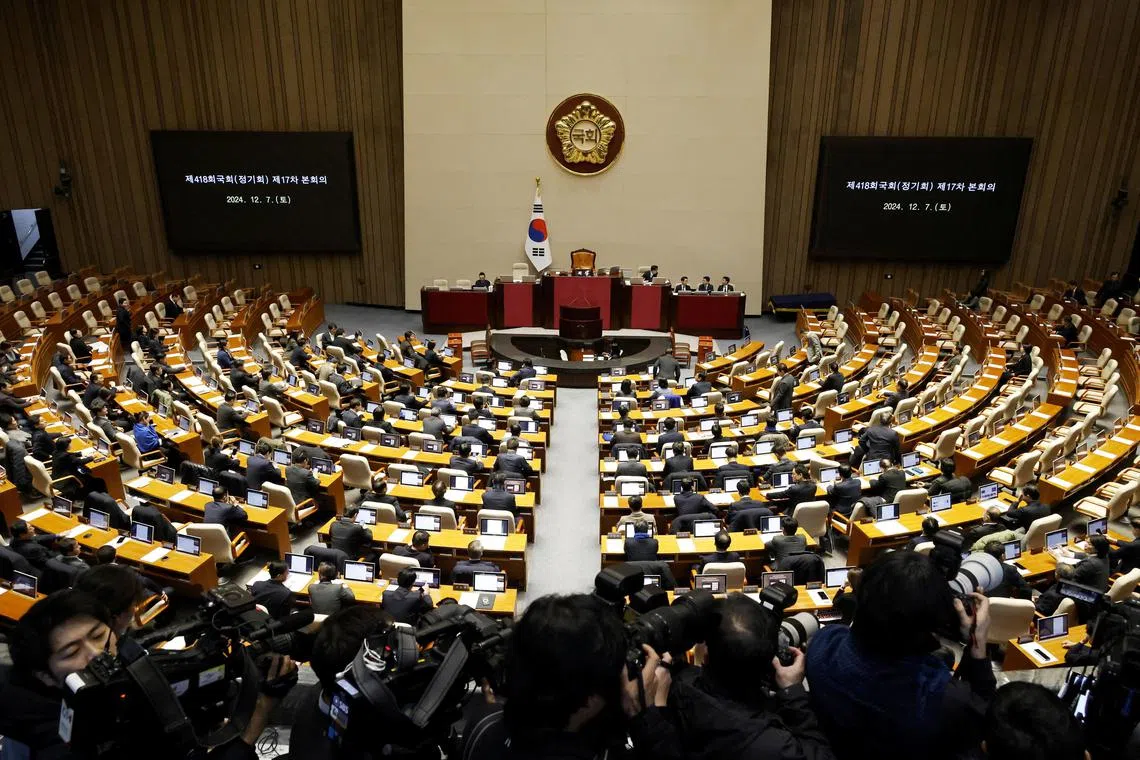South Korea opposition accuses ruling party of ‘second coup’
Sign up now: Get insights on Asia's fast-moving developments

A bid to impeach President Yoon Suk Yeol failed on Dec 7 after a boycott by the ruling party.
PHOTO: REUTERS
SEOUL – South Korea’s opposition on Dec 9 accused the ruling party of staging a “second coup” by clinging to power and refusing to impeach President Yoon Suk Yeol over his declaration of martial law.
He plunged the country into political chaos with his attempt to scrap civilian rule.
His shock move on Dec 3 lasted just six hours after lawmakers scuffled with soldiers in Parliament and managed to vote the measure down, forcing Mr Yoon into an embarrassing U-turn.
He and a slew of top officials are now being investigated for insurrection. A bid to impeach Mr Yoon failed on Dec 7 after a boycott by the ruling party, which claimed the wildly unpopular leader had agreed to hand power to the prime minister and party chief.
“This is an unlawful, unconstitutional act of a second insurrection and a second coup,” Democratic Party floor leader Park Chan-dae said, urging the ruling party to “stop it immediately”.
Under South Korea’s Constitution, the president remains head of government and commander-in-chief of the army unless he or she is incapacitated, resigns or steps down.
In such a case, power will be handed to the prime minister on an interim basis, until elections can be held.
Claiming that Mr Yoon can remain in office but has delegated his powers to the prime minister and leader of his ruling People Power Party – who is not an elected official – is “a blatant constitutional violation with no legal basis”, Mr Park noted.
“Their attitude of placing themselves above the Constitution mirrors that of insurrectionist Yoon Suk Yeol,” he added.
The chief prosecutor of the Corruption Investigation Office for High-ranking Officials has ordered a travel ban on Mr Yoon, and the police said on Dec 9 that he could be called in for questioning.
Investigators have detained former defence minister Kim Yong-hyun, raided his offices
“There are no human or physical restrictions to the subject of an investigation,” said Mr Woo Jong-soo, head of the National Investigation Headquarters of the National Police Agency.
Police will investigate “in accordance with the law and principles – without any exceptions”.
The defence ministry confirmed on Dec 9 that Mr Yoon remained at the head of the country’s security apparatus, despite the apparent power vacuum in the country – which remains technically at war with the nuclear-armed North.
“Legally, (control of military forces) currently lies with the commander-in-chief,” defence ministry spokesperson Jeon Ha-kyou said.
Mr Yoon, 63, has apologised for “anxiety and inconvenience” caused by his declaration of martial law. B
There is no constitutional basis supporting the ruling party’s claim that Mr Yoon can stay in office but hand over his power to unelected party officials, said Mr Kim Hae-won, a constitutional law professor at Pusan National University Law School.
“It seems to resemble an unconstitutional soft coup,” he added.
“If there are issues with the president, there are ways laid out in the Constitution such as suspending the president from his duties, and then move on to proceedings set out in the Constitution, such as impeachment,” he noted.
The opposition has said it will try again to impeach the President, with leader Lee Jae-myung saying another vote would be held on Dec 14.
Huge crowds are expected to gather again outside the National Assembly building.
Mr Yoon’s approval rating hit 11 per cent, a historic low for the President, according to a new Gallup poll commissioned by local media. AFP


